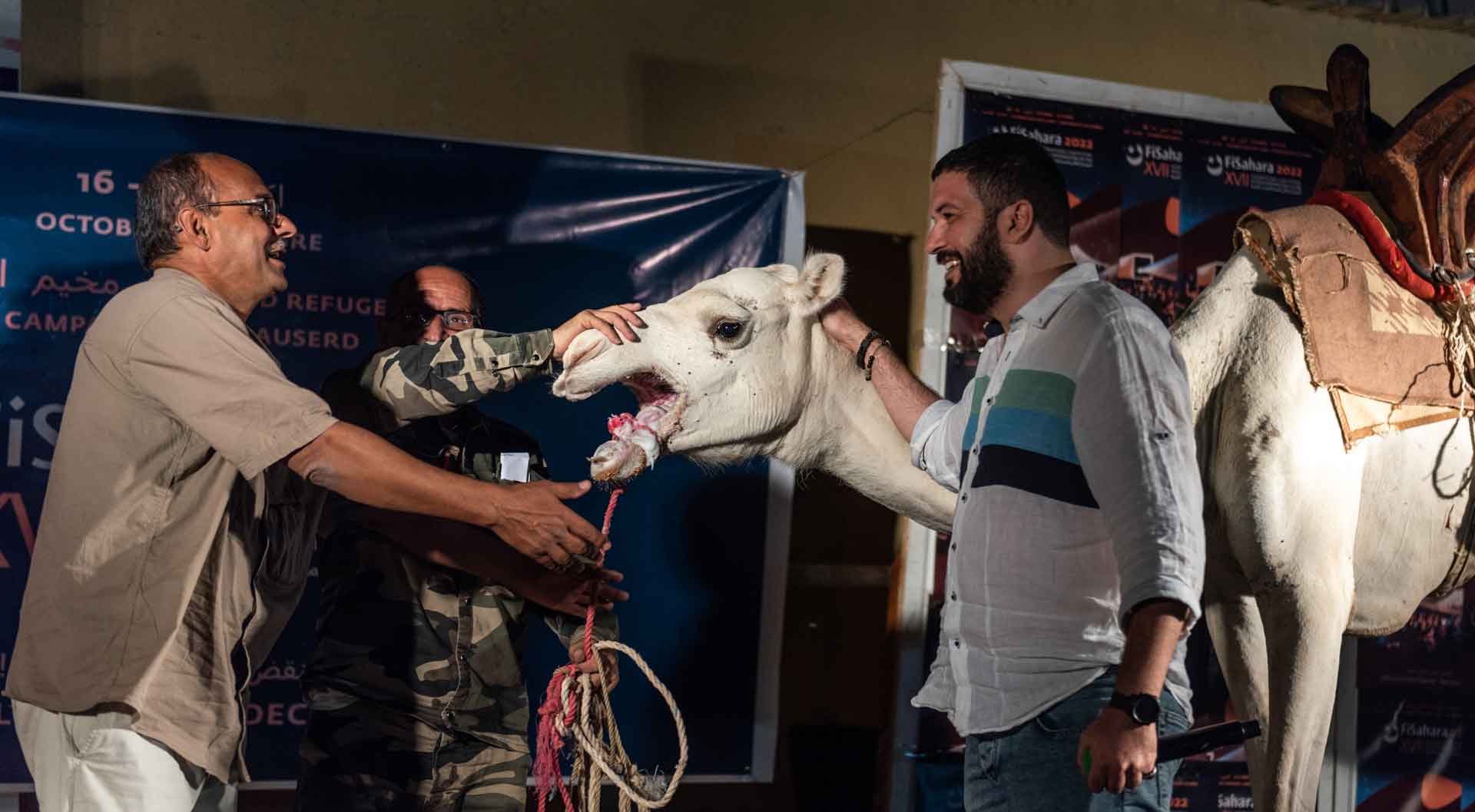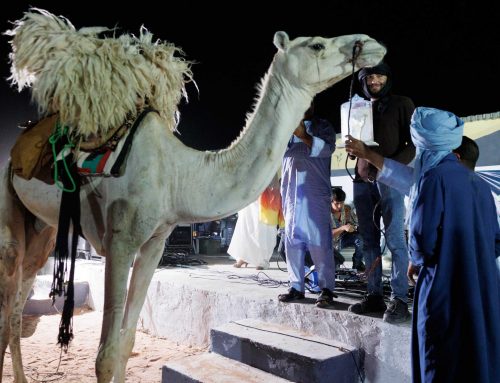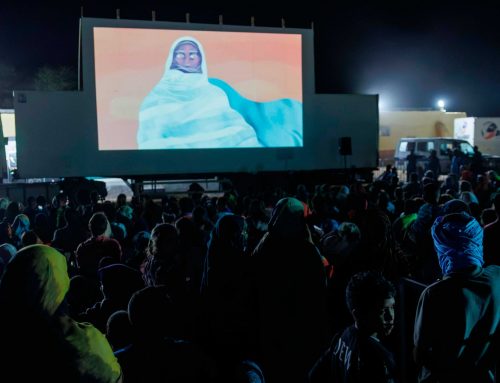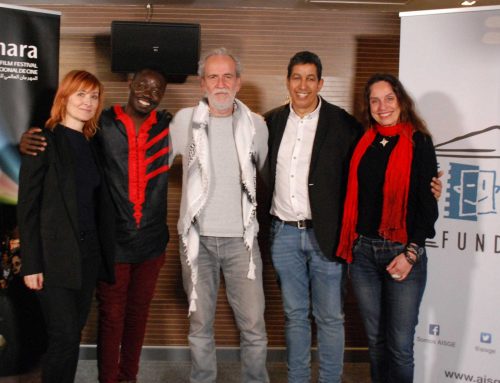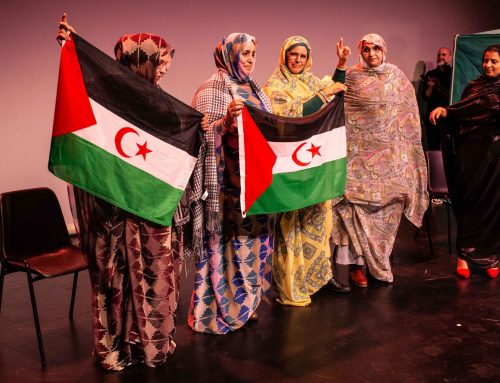Wanibik, the people who live in front of their land, by the Algerian director Rabah Slimani, has been the winning film of the White Camel (symbol of peace for the Saharawi people) in the XVII edition of FiSahara (Western Sahara International Film Festival). The film, shot in the Saharawi refugee population camps, tells the story of a group of students from a film school who, for their final year project, decide to shoot on the Wall of Shame erected and mined by Morocco, in the middle of the current war that is being waged after the breaking of the ceasefire by the Alawite regime in November 2020.
The school that appears in the film is the Abidin Kaid Saleh Film School, created by FiSahara in 2011 in the camp of boulder,Special Award at the San Sebastian Film and Human Rights Festival and recent winner of the González Sinde Award 2022 awarded by the Spanish Film Academy.
Slimani, who refused to premiere his film until the premiere at FiSahara had taken place, said “participating is very special for me and for my team, because FiSahara is the festival of truth and the truth is very important in this type of events and in the cinema.” The Algerian director, who describes Wanibik as “a film by the Sahrawis for the Sahrawis”, highlighted that “the first great prize was to project the film on the FiSahara Desert Screen because the smiles of the Sahrawi public in the refugee camps made me feel very proud when I saw them. That is the best award for me.”
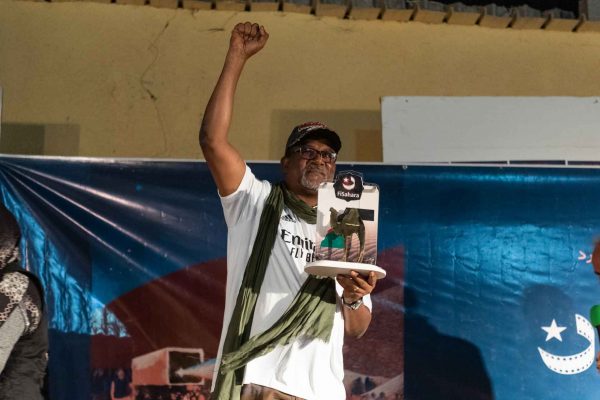
Abdoulaye Diallo lifts the second prize of FiSahara. – Gonzalo Cases.
For its part, Burkinabè Rising: the art of resistance in Burkina Faso, by the Brazilian-Korean director Iara Lee, won the second prize. The founder and coordinator of the Festival of Cinema and Human Rights and Freedom of Expression La Droit Libre, Abdoulaye Diallo, was in charge of collecting the award. Finally, the film The Nomad Garden, by the Sahrawi director Mohamed Salem Mohamed Ali, received the third of the festival’s awards. The film tells the story of how a young Sahrawi refugee grows vegetables in one of the most inhospitable places in the world, facing water scarcity, extreme temperatures and barren land.
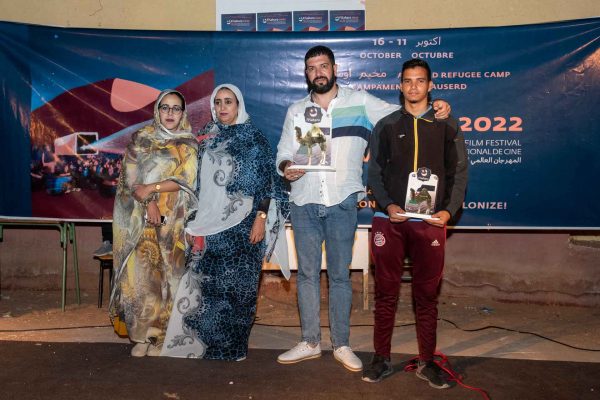
From left to right, activists Lellu Mustafa and Mina Baali with Rabah Slimani and Mohamed Salem Mohamed Ali. – Gonzalo Cases
The gala had the participation of the actress Itziar Ituño and the actor Guillermo Toledo as masters of ceremonies. Diallo, the Afro-Colombian social communicator Emiliana Bernard and the filmmaker and journalist Dorothée Myriam Kellou read a statement prepared by them, in which they expressed their gratitude to FiSahara and the Saharawi people, joining “as new ambassadors in the fight for rights, dignity and the reunification of Western Sahara”.
Amaral closed the gala with an acoustic concert in which the Saharawi percussionist Backa Ambark del grupo Alwali joined to perform some of the songs. The group from Zaragoza, which had already pointed out that “we come with the idea that our music is a vehicle to contribute to draw attention to the situation of the Sahrawi people”, stressed that “it is very enriching to see how the Sahrawi people use their culture as an instrument of identity and struggle. For us it is a shock to find ourselves in this tremendously unfair situation and to see the dignity with which they face this situation and this struggle”.
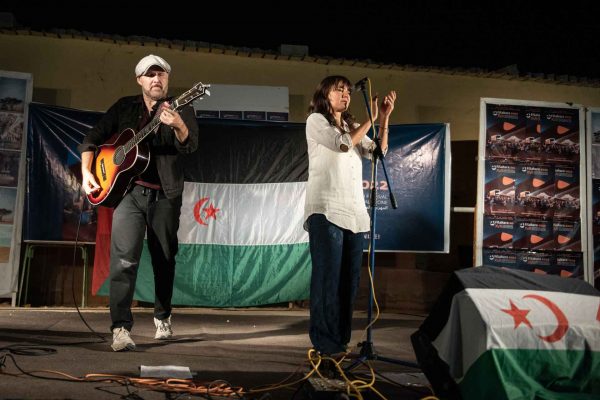
Amaral closed the gala with a graet concert. – Gonzalo Cases.
FiSahara is here to stay
During the six days of the festival, the event has developed a multitude of activities (round tables, workshops, journalism master class in Occupied Territories, concert in the dunes, visit to the Film School…), as well as Le Frig, a space for tents traditional Sahrawis in which the different wilayas (camps) compete in different categories. The winners were headed in the national Exemplary Tent competition by the wilaya of Ausserd, followed by those of Smara, El Aaiún, Bojador and Dajla. Likewise, in the local competition, the winning daira (neighborhood) was Mijik, ahead of those from Birganduz; Lguera and Zug, who tied, Aguinit and Tichla.
Tiba Chagaf, director of FiSahara and the Abidin Kaid Saleh Film School, pointed out that “once again, defying all natural, supernatural and human forces, a FiSahara is being made again, which is becoming more consolidated, with a more coordinated and synchronized team to put cinema at the service of a cause that needs be told.“ Along the same lines, María Carrión, executive director of FiSahara, pointed out that “this edition comes to an end with the bar higher than ever, not only for having managed to resist during these years, but also because it has done so by strengthening itself“.
With the slogan #Decolonize and the screening of films about Palestine, Algeria, Burkina Faso or Western Sahara, “the cinema event in the dunes has generated a twinning between peoples who have suffered and continue to suffer the ravages of colonialism,” added Carrión. From Chagaf’s point of view, “the peculiarity of this edition has been that connection that we have made with three continents at the same time projecting the same film, feeling the same emotions while being so far apart and so united at the same time.”
The director refers to the world premiere that took place during FiSahara of Little Sahara, the short film by director Emilio Martí, which received a Special Mention from the Jury. Despite the technical difficulties, the connection was made simultaneously with FiSahara, the solidarity festival Help me Please of Granada and the Festival Voices from Western Sahara which took place in Xalapa and Mexico City (Mexico).
“Cinema becomes strong locally, with young Sahrawis using the seventh art to rescue ancestral customs, but at the same time it has more international capacity”, Carrión stresses. “The FiSahara is here to stay,” concluded Chagaf.

